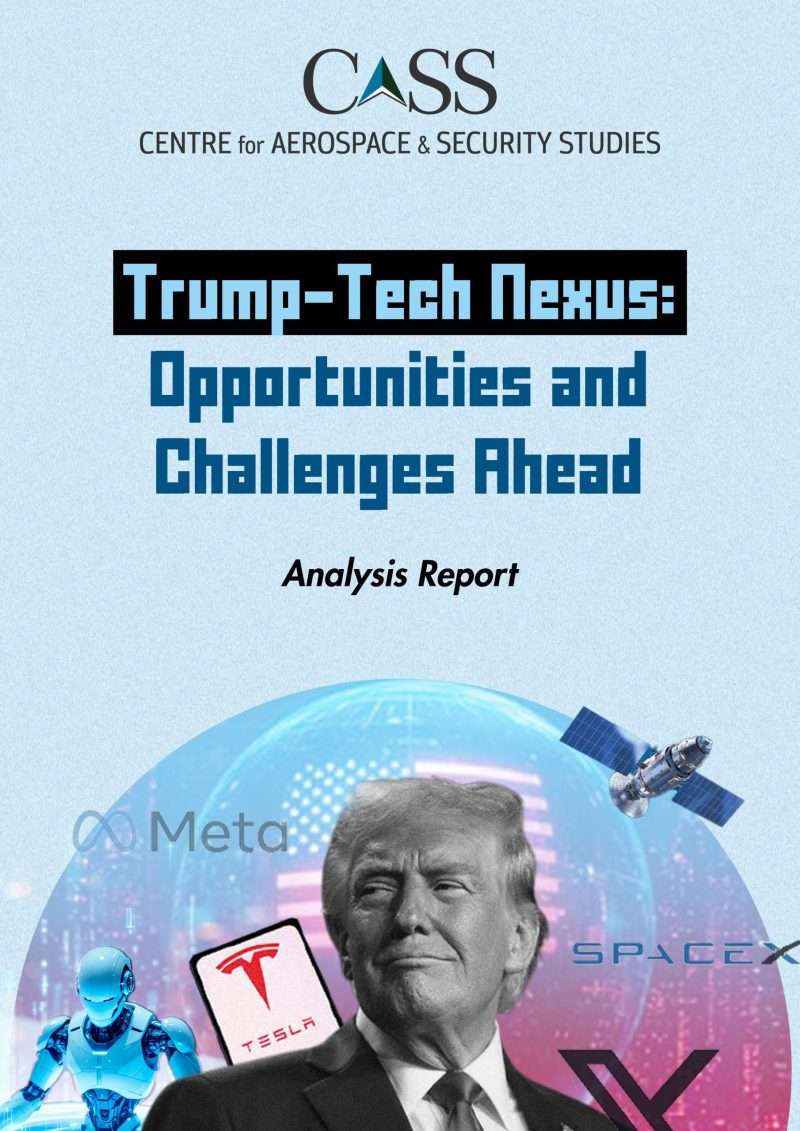The inauguration of Donald Trump for a second term as President of the United States (US) brings substantial implications for the tech industry, particularly in areas such as Big Tech, Artificial Intelligence (AI), cybersecurity, and private sector innovations. During his previous tenure, President Trump advanced policies that significantly shaped the tech landscape, including a focus on social media platforms to address perceived biases, introduction of the U.S. Space Force, and initiatives to strengthen the US’s global technological leadership. Furthermore, collaboration between Trump and key tech leaders, such as Elon Musk, signals a direct ingress of the private sector in public policy domain. Musk’s leadership of SpaceX, Tesla, and X (formerly Twitter) alongside his alliance with the Trump administration, is poised to reshape the landscape of tech policies, with implications for US innovation, defence, and foreign policy. Trump’s proposed ‘Digital Bill of Rights’ and his critique of tech monopolies could have major ripple effects across global technology sectors, like AI, data privacy, and content moderation. At the same time, Trump Administration’s drive to bolster US technological and industrial capabilities could lead to new innovations while raising concerns about the future trends of emerging technologies, including AI, quantum computing, and renewable energy. In an effort to explore the multidimensional implications of Trump’s second presidency on the tech industry, the Centre for Aerospace & Security Studies (CASS), Islamabad, organised a roundtable on ‘Trump-Tech Nexus: Opportunities and Challenges Ahead’ on 29 January 2025. This RTC focused on forward-looking insights on the following questions: How will Trump’s tech policies influence the US position in the global technology race and tech market? How will Trump’s ‘Digital Bill of Rights’ impact Big Tech’s content moderation practices and accountability? What opportunities and risks does Trump’s focus on the tech industry present for the global community? What are the potential implications of Trump’s tech-focused policies for US diplomatic relations? Does Pakistan stand to benefit from the tech policies of US under Trump 2.0? The distinguished speakers included Ambassador Zamir Akram, Air Vice Marshal Soban Nazir Syed (Retd), and Talha Bin Afzal. The discussion was moderated by Mustafa Bilal, Research Assistant at CASS with Concluding Remarks by President CASS Air Marshal Javaid Ahmed (Retd).

Share this article

The Extraction Trap
Trump’s declaration to “run Venezuela” after Maduro’s capture is a seeming promise of a sudden cure to Venezuela’s ills. However, it ignores the nation’s terminal diagnosis of a century of plunder. The rhetoric of imminent revival on the basis of the speedy return of international oil capital and the promise of 100 billion US dollars in reconstruction funds made the intervention seem like a unique opportunity.

Future Shield: The Saudi-Pakistan Security Partnership
Although the SDMA does not identify an adversary, effectively functioning as a deterrent, it cannot be viewed in isolation from the Israeli belligerence in the Middle East. Israel’s war against Hamas has expanded beyond the genocide of Gaza; it has bombed the West Bank, Lebanon, Syria, Yemen, Iran, and recently Qatar. Tel Aviv’s campaign under the banners of ‘anti-Semitism’ and ‘terrorism’ has engulfed the whole Middle East in a war-like situation, which has generated new enemies and has deepened the instability of the region.

The Trilateral Shift
On 15 January 2026, the Pakistani defence production minister confirmed that an agreement for a new trilateral defence deal between Pakistan, Saudi Arabia, and Türkiye is in the pipeline, other than the Pakistan-Saudi bilateral deal announced last year.

